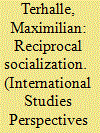| Srl | Item |
| 1 |
ID:
085304


|
|
|
|
|
| Publication |
2008.
|
| Summary/Abstract |
Fifteen years ago, Charles Kegley spoke of a neoidealist moment in international relations. This article examines how the number of armed conflicts has declined in the decade and a half since Kegley's presidential address and shows that the severity of war has been declining over a period of over six decades. The number of countries participating in war has increased, but this is in large measure due to coalition-building in several recent wars. Overall, there is a clear decline of war. It seems plausible to attribute this to an increase in the three factors identified by liberal peace theorists: democracy, trade, and international organization. Four alternative interpretations are examined: the temporary peace, the hegemonic peace, the unsustainable peace, and the capitalist peace. The article concludes that the latter, while running close to the liberal peace interpretation, also presents the greatest challenge to it. Indeed, we seem to be living in a commercial liberal period rather than a world of neoidealism.
|
|
|
|
|
|
|
|
|
|
|
|
|
|
|
|
| 2 |
ID:
107979


|
|
|
|
|
| Publication |
2011.
|
| Summary/Abstract |
This article asks how the international order can be renegotiated with rising powers. Negotiating understood as a process of socialization is the focus of the article. However, given non-Western states' recent practice of powerfully permeating the existing Western order, it is difficult to explain this process by means of neorealist, constructivist, or liberal socialization. Respectively, they presuppose that some states are already socialized while others need to be adopted into the club of socialized members. In contrast, this article suggests the notion of reciprocal socialization. It explains how rising powers are socialized into the order, while reshaping it when they enter. Two conditions need to be fulfilled to accomplish a socializing process that reflects the reciprocal influencing of states of the Western security community and non-Western veto-players; these are employing "small informal groups" and "personalized interactions." Their application can be viewed in informal operational rules which are, in turn, capable of governing the renegotiations.
|
|
|
|
|
|
|
|
|
|
|
|
|
|
|
|